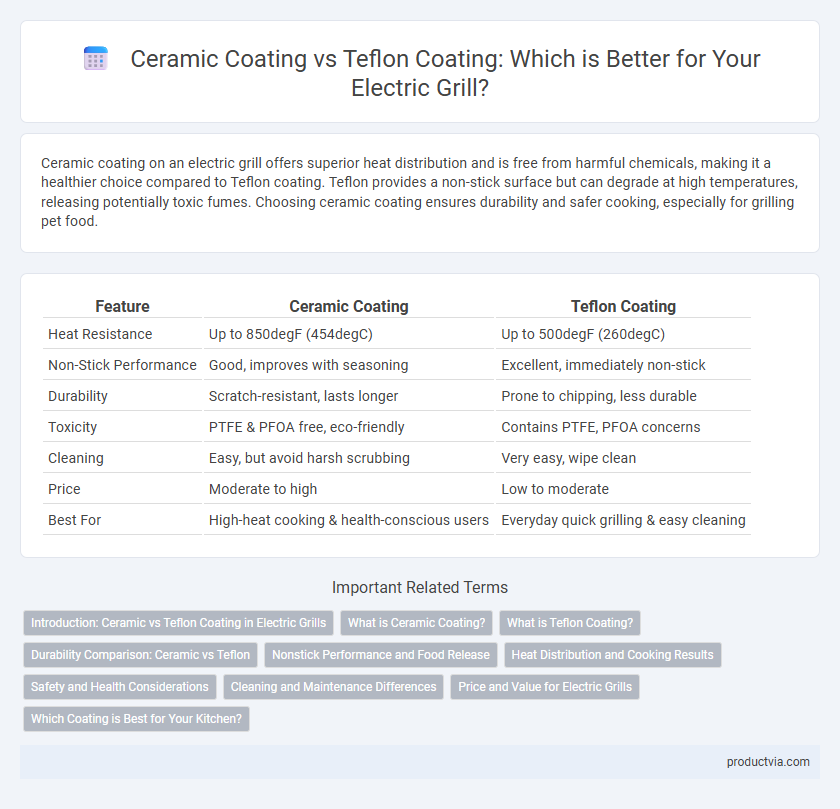Ceramic coating on an electric grill offers superior heat distribution and is free from harmful chemicals, making it a healthier choice compared to Teflon coating. Teflon provides a non-stick surface but can degrade at high temperatures, releasing potentially toxic fumes. Choosing ceramic coating ensures durability and safer cooking, especially for grilling pet food.
Table of Comparison
| Feature | Ceramic Coating | Teflon Coating |
|---|---|---|
| Heat Resistance | Up to 850degF (454degC) | Up to 500degF (260degC) |
| Non-Stick Performance | Good, improves with seasoning | Excellent, immediately non-stick |
| Durability | Scratch-resistant, lasts longer | Prone to chipping, less durable |
| Toxicity | PTFE & PFOA free, eco-friendly | Contains PTFE, PFOA concerns |
| Cleaning | Easy, but avoid harsh scrubbing | Very easy, wipe clean |
| Price | Moderate to high | Low to moderate |
| Best For | High-heat cooking & health-conscious users | Everyday quick grilling & easy cleaning |
Introduction: Ceramic vs Teflon Coating in Electric Grills
Ceramic coating in electric grills offers superior heat resistance and non-stick properties, making it ideal for high-temperature cooking without releasing harmful chemicals. Teflon coating provides excellent non-stick performance and ease of cleaning but may degrade under extreme heat, potentially releasing toxic fumes. Choosing between ceramic and Teflon coatings depends on durability preferences, cooking temperatures, and health considerations.
What is Ceramic Coating?
Ceramic coating on electric grills is a non-stick surface made from inorganic minerals that withstands high temperatures without releasing harmful fumes. It provides superior heat distribution and durability compared to traditional Teflon coatings, which are prone to scratching and can degrade under extreme heat. Ceramic coatings are also environmentally friendly and easier to clean, making them a preferred choice for health-conscious consumers.
What is Teflon Coating?
Teflon coating is a synthetic polymer known as polytetrafluoroethylene (PTFE) widely used in electric grills for its non-stick properties, allowing easy food release and effortless cleaning. This coating provides a smooth surface that resists sticking and reduces the need for excessive oil or butter, promoting healthier cooking. However, Teflon's effectiveness can diminish at high temperatures and may release harmful fumes if overheated beyond 500degF (260degC).
Durability Comparison: Ceramic vs Teflon
Ceramic coating on electric grills offers superior durability, resisting high temperatures and scratches better than Teflon coatings. Teflon coatings, while effective for non-stick performance, tend to degrade faster under frequent use and high-heat conditions. Ceramic coatings also maintain their non-stick properties longer, making them a more lasting option for electric grill surfaces.
Nonstick Performance and Food Release
Ceramic coating offers excellent nonstick performance, allowing food to release easily without sticking, even at higher temperatures, and is free of harmful chemicals like PTFE and PFOA. Teflon coating provides superior food release with a smooth, slick surface but may degrade over time when exposed to high heat, reducing its nonstick effectiveness. Both coatings enhance cooking convenience, but ceramic is often preferred for durability and safer high-heat cooking.
Heat Distribution and Cooking Results
Ceramic coatings on electric grills offer superior heat distribution, ensuring even cooking and minimizing hot spots compared to Teflon coatings, which can sometimes result in uneven heat transfer. The ceramic surface maintains consistent temperatures, enhancing food texture and preventing burning, while Teflon coatings excel in non-stick properties but may degrade faster under high heat. Optimal cooking results often favor ceramic-coated grills for uniform heat and durability, whereas Teflon-coated grills prioritize easy food release and maintenance.
Safety and Health Considerations
Ceramic coating on electric grills offers a non-toxic, chemical-free surface that withstands high temperatures without releasing harmful fumes, making it a safer option for health-conscious users. Teflon coating, while providing excellent non-stick properties, can emit toxic fumes if overheated above 500degF (260degC), posing potential respiratory risks. Choosing ceramic coating reduces exposure to hazardous substances and promotes safer cooking practices in electric grills.
Cleaning and Maintenance Differences
Ceramic coatings on electric grills offer superior ease of cleaning due to their non-porous, scratch-resistant surface that prevents food from sticking and reduces residue buildup. In contrast, Teflon coatings, while providing good non-stick properties initially, tend to degrade over time and may require more delicate cleaning techniques to avoid peeling or scratching. Regular maintenance for ceramic-coated grills typically involves simple wiping with mild soap and water, whereas Teflon-coated grills demand careful use of non-abrasive tools and avoidance of high heat to preserve the coating's integrity.
Price and Value for Electric Grills
Ceramic coatings on electric grills generally cost more upfront but offer superior heat retention and scratch resistance, enhancing long-term value for users seeking durability. Teflon coatings are more affordable and provide excellent non-stick performance, making them ideal for budget-conscious consumers prioritizing ease of cleaning. Considering price versus value, ceramic-coated grills offer better longevity, while Teflon-coated models deliver cost-effective convenience.
Which Coating is Best for Your Kitchen?
Ceramic coating on electric grills offers superior heat resistance and non-toxic properties, making it ideal for health-conscious cooking, while Teflon coating provides excellent non-stick performance and easy cleaning at a lower cost. Ceramic coatings typically last longer and withstand higher temperatures without releasing harmful fumes, whereas Teflon coatings may degrade over time and require careful use to avoid flaking. Choosing the best coating depends on your kitchen priorities: durability and safety favor ceramic, while affordability and effortless maintenance lean toward Teflon.
Ceramic coating vs Teflon coating for electric grill Infographic

 productvia.com
productvia.com